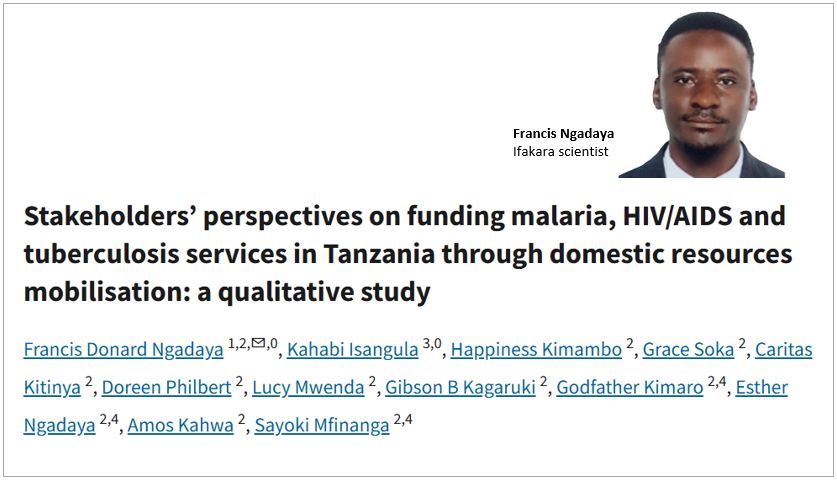
HEALTH FINANCING: Closing the funding gap for malaria, HIV, and TB

A new study has warned that Tanzania must urgently find sustainable ways to finance its fight against malaria, HIV/AIDS, and tuberculosis (TB) as funding from international donors continues to decline, partly due to global pressures.
Published in BMJ Public Health, the research highlights how declining aid—further strained by the impact of the COVID-19 pandemic—has left serious gaps in the resources needed to sustain life-saving health services. Scientists caution that without strong domestic financing solutions, progress against the three diseases could stall.
The study was led by Francis Ngadaya of Ifakara Health Institute, in collaboration with colleagues from the National Institute for Medical Research (NIMR) – Muhimbili Research Centre. The team drew insights from 76 policymakers, health managers, and frontline healthcare workers across Tanzania to explore strategies for mobilizing domestic resources for disease control.
Domestic solutions to close the gap
To bridge the funding gap, participants proposed several domestic approaches, including the establishment of a universal health insurance scheme, introducing taxes on certain products and services, creating disease-specific funds, and reducing beneficiaries of service exemptions such as groups that receive free health services.
Strengthening accountability in health spending
The stakeholders also stressed the need for stricter accountability in how health funds are managed as well as stronger local management of resources. Further suggestions included allocating a set percentage of district revenues to health services, decentralizing funding decisions to local facilities, and creating disease-specific funds such as a TB Trust Fund.
Improving drug availability through local manufacturing, reducing waste in hospitals, and investing more in prevention and early diagnosis were also highlighted as cost-saving measures that could stretch limited resources further.
Addressing roadblocks to implementing reforms
While these measures could ease reliance on external aid, the study warns of challenges ahead. Stakeholders cited poor public awareness, conflicting political promises, and concerns about accountability as key barriers. Without clear communication and stronger systems for transparency, they fear public resistance and misuse of funds could undermine the effort.
A call to invest more from within
The researchers conclude that Tanzania must reduce its heavy dependence on donors to safeguard hard-won progress against malaria, HIV, and TB.
They emphasized that “community sensitisation and improved fund accountability” will be key in gaining public support and ensuring resources are used effectively.
“The study provides new evidence on alternative strategies for domestic funding of malaria, HIV/AIDS, and tuberculosis services,” the authors noted. “The findings will inform the development of policies that promote sustainable funding mechanisms, stakeholder engagement, and increased government investment in health service delivery.”
Read the publication here.
